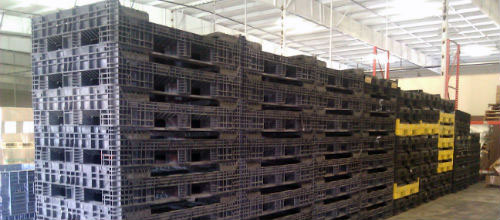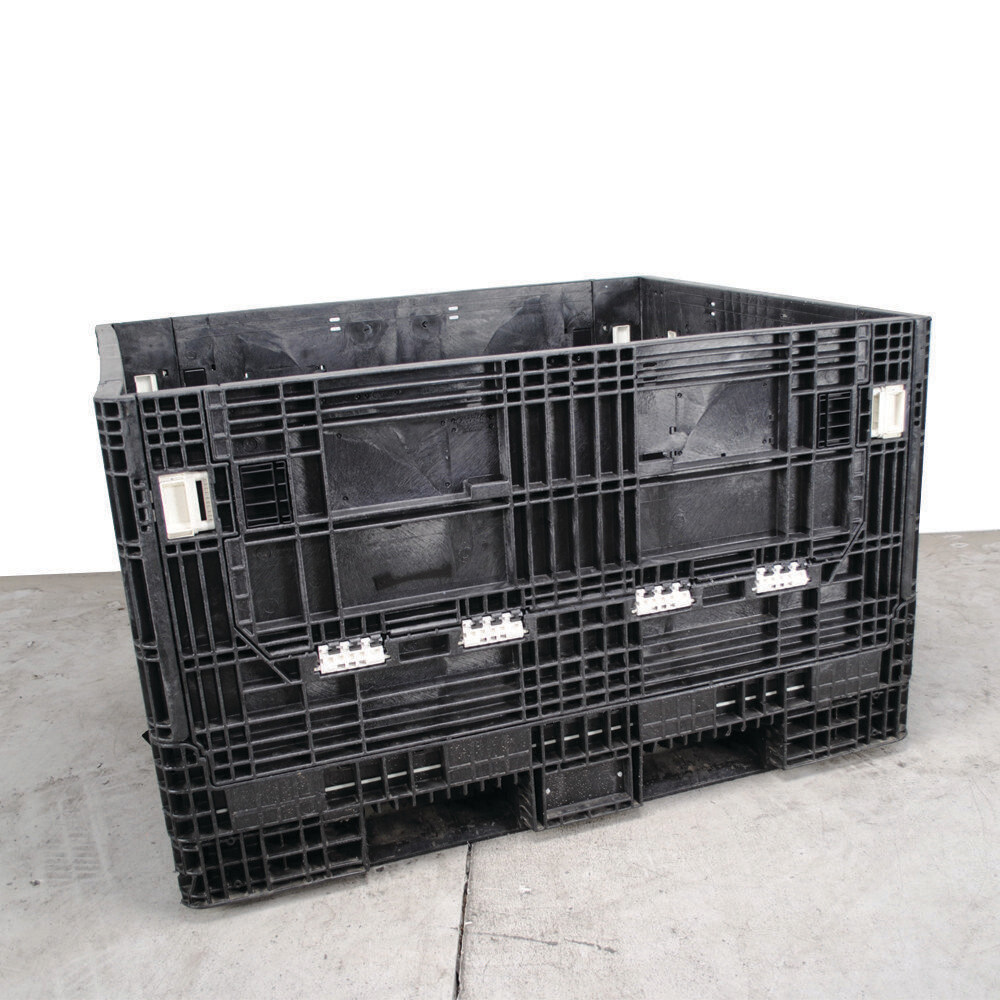The Ultimate Overview to Picking the Right Bulk Containers for Your Organization Requirements
Selecting the appropriate bulk containers is vital for any organization that counts on efficient logistics. Numerous kinds of containers exist, each created for details products and applications. Aspects such as dimension, material compatibility, and governing criteria play a significant role in this decision-making procedure. Understanding these elements can bring about boosted functional effectiveness. Nevertheless, many businesses neglect important aspects that could enhance their general effectiveness and sustainability. What are these considerations?
Understanding Various Sorts Of Bulk Containers
Mass containers serve as vital tools for companies seeking effective storage and transport services. These containers can be found in numerous kinds, each created to satisfy specific functional demands. One typical kind is the intermediate mass container (IBC), which is perfect for liquid and granulated products, supplying a balance of ability and ability to move. Another popular option is the mass bag, or FIBC, ideal for completely dry, flowable products. These versatile containers are light-weight and can be quickly transferred and kept. For heavier materials, stiff mass containers are commonly employed, giving longevity and security for risk-free handling. In addition, there are specialized containers customized for unsafe materials, guaranteeing conformity with safety and security policies. Understanding the distinctive features of these bulk container kinds enables services to make educated decisions that enhance logistics and minimize prices. By selecting the right container, firms can improve their functional efficiency and enhance their supply chain processes.
Trick Material Considerations for Mass Containers
When picking mass containers, it is important to consider the products utilized in their building. Variables such as durability, stamina, and chemical compatibility play a vital duty in making certain the containers fulfill details operational requirements. In addition, weight and transportability issues can influence both effectiveness and transportation logistics.
Material Longevity and Toughness
Longevity and strength are vital aspects in picking products for bulk containers, as they straight affect the container's capability to stand up to numerous environmental conditions and handling procedures. Products such as high-density polyethylene (HDPE), polypropylene, and stainless steel are typically preferred for their robust properties, supplying resistance to influence, temperature level, and abrasion changes. The selection of product likewise impacts the total lifespan of the container; stronger materials normally result in much less constant substitutes, bring about set you back financial savings with time. Additionally, the weight of the material can influence shipping costs and simplicity of handling. Companies should consider their certain operational atmospheres and the possibility for damage to assure peak longevity and strength in their bulk container choice.
Chemical Compatibility Aspects
Recognizing chemical compatibility is vital for selecting mass containers, as the materials utilized need to withstand the details compounds they will hold. Numerous elements influence compatibility, consisting of the chemical nature of the materials, temperature level, and duration of storage. Harsh chemicals might call for containers made from stainless steel or specialized plastics that stand up to deterioration. Furthermore, responsive materials can produce warmth or gases, requiring aired vent or pressure-rated containers. The selection of container product, whether polyethylene, polycarbonate, or metal, need to line up with the chemical residential properties of the kept substances to avoid leakages or violations. Ultimately, an extensive assessment of these compatibility aspects guarantees secure handling and storage space, securing both personnel and the setting while maintaining item integrity.
Weight and Portability Worries
Selecting bulk containers involves not just assessing chemical compatibility but also thinking about weight and mobility. Organizations need to examine the convenience of handling and transport to optimize effectiveness. Lightweight materials like high-density polyethylene (HDPE) or aluminum can assist in much easier movement and reduce shipping costs. Alternatively, larger containers might provide improved sturdiness however can impede movement, specifically in atmospheres needing regular relocation. Additionally, the design of the container need to permit hassle-free training and stacking, making sure ergonomic safety for workers. Business must also take into consideration the facilities readily available for transportation; for instance, containers suitable with forklifts or pallet jacks can improve procedures. Ultimately, the appropriate equilibrium between weight and mobility straight affects functional performance and price performance.
Sizing Your Mass Containers for Optimal Performance
When sizing bulk containers, businesses need to thoroughly assess the dimensions required to fit their specific items. Furthermore, weight ability is a crucial aspect that affects performance and safety and security throughout transport and storage space. Efficient sizing not just makes the most of space but additionally optimizes operational process.
Figuring Out Container Dimensions
Choosing the right dimensions for mass containers is vital for making best use of performance in storage space and transportation. Services have to analyze their particular needs, taking into consideration factors such as readily available area, the nature of the products being stored, and the techniques of transportation utilized. Exact measurements ensure that containers fit preferably in storehouses and cars, minimizing lost area and minimizing dealing with time. Criterion dimensions can provide ease, yet personalized measurements could be necessary for one-of-a-kind needs or to suit certain items. Furthermore, it is necessary to examine piling capacities and availability, as these Get the facts factors influence general functional performance. Ultimately, the ideal dimensions lead to improved organization and streamlined logistics, profiting the overall efficiency of the organization.
Weight Ability Considerations
Comprehending weight ability is crucial for companies aiming to enhance their mass container effectiveness. The weight capability of a container straight affects storage space capacities, transport logistics, and total operational expenses. Picking containers with the suitable weight limitations ensures that services can securely save and carry their goods without risking damages or compliance problems. Overloading containers can result in structural failures, while Full Article underutilizing capability results in squandered sources. It is necessary for organizations to assess their item weights and take into consideration any type of governing requirements when selecting containers. Furthermore, variables such as the kind of material, planned usage, and environmental problems should also affect weight capability choices. By assessing these components, companies can improve performance and assure a structured supply chain.
Governing Conformity and Safety And Security Criteria

Regulatory conformity and safety criteria play a crucial role in the option of bulk containers for businesses. Organizations must ensure that their containers meet various policies established by regional, national, and global authorities. These requirements commonly concern product safety, architectural honesty, and proper labeling, which help stop accidents and ensure the secure transport of goods.
Furthermore, adherence to industry-specific guidelines, such as those from the Fda (FDA) or the Occupational Security and Wellness Management (OSHA), is important for firms handling hazardous materials or foodstuff. Non-compliance can result in penalties, lawful issues, or damages to a business's track record.
Organizations should also take into consideration the container's compatibility with the materials being stored or delivered to prevent contamination or chain reaction (refurbished bulk containers). To summarize, understanding and executing regulatory conformity and safety requirements is vital for the accountable and efficient use of bulk containers
Sustainability Options for Eco-Friendly Bulk Containers

Business are additionally checking out alternatives made from recycled materials, which not just conserve resources however likewise sustain the reusing industry. In addition, developments in design enable lighter containers that require less power to transport, additionally enhancing sustainability. By incorporating these environment-friendly mass container alternatives, companies can demonstrate their commitment to environmental stewardship while satisfying consumer need for lasting techniques. This shift not just assists the world however can likewise boost brand name reputation and consumer loyalty.
Cost-Effectiveness and Budgeting for Mass Containers
While numerous services concentrate on sustainability, cost-effectiveness stays an important aspect when picking bulk containers. Organizations has to assess the initial purchase rate, in addition that site to long-term operational prices, to guarantee economic practicality. Variables such as upkeep, sturdiness, and reusability play a substantial role in identifying overall costs.
Purchasing high-grade containers might produce higher in advance prices however can cause financial savings via minimized replacement rates and reduced waste. In addition, services must think about transportation expenses and storage performance, as these can impact the total budget.

Regularly Asked Inquiries
Just how Do I Determine the Right Container for Hazardous Products?
To determine the best container for harmful materials, one need to evaluate compatibility with the material, consider the container's material, check for regulatory compliance, and analyze ability and safety and security features to ensure appropriate handling and storage.
Can Mass Containers Be Customized for Specific Products?
Yes, bulk containers can be customized for particular items. refurbished bulk containers. Numerous features, such as size, material, and design, can be customized to satisfy special requirements, guaranteeing excellent security and effectiveness for delivering and keeping different products
What Is the Average Life Expectancy of Various Mass Container Kind?
The ordinary lifespan of mass container types differs; plastic containers last 5-10 years, metal containers 10-20 years, and wood containers usually last 3-7 years, relying on usage, maintenance, and ecological problems.
How Should I Clean and Maintain Mass Containers?
To clean and maintain bulk containers, one ought to on a regular basis evaluate for damage, remove residue, wash with ideal detergents, wash completely, and guarantee correct drying out before storage space. Adhering to supplier guidelines boosts long life and safety during use.
Exist Rental Options for Mass Containers Available?
Yes, various companies use rental choices for mass containers, offering flexibility for businesses. These rentals can suit various demands, allowing firms to handle stock successfully without the commitment of acquiring containers outright.
Resilience and stamina are critical elements in selecting materials for bulk containers, as they directly affect the container's capacity to endure different environmental conditions and managing processes. Understanding chemical compatibility is important for picking bulk containers, as the products made use of need to withstand the certain compounds they will hold. Understanding weight ability is essential for companies aiming to optimize their mass container effectiveness. Regulatory compliance and safety and security criteria play an important duty in the option of mass containers for companies. While numerous businesses concentrate on sustainability, cost-effectiveness stays a vital variable when choosing mass containers.